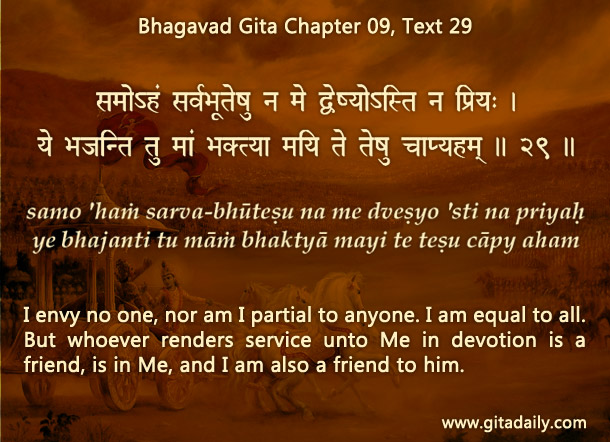Krishna states in the Bhagavad-gita’s ninth chapter he is equal to everyone (09.29). Then why is he taking one side on the Kurukshetra battlefield: Arjuna’s, not Duryodhana’s?
First, does God’s equality toward everyone mean that he is forever forbidden from taking any side in any conflict? Wouldn’t that reduce God to an inconsequential non-factor, a cipher? Divine equality toward everyone doesn’t mean divine passivity; it means universal responsibility for everyone and proportional reciprocity with everyone.
Universal responsibility: Krishna is everyone’s ultimate parent; he wants the ultimate good for all his children. Irrespective of whether people behave virtuously or viciously, he responsibly stays with them as their indwelling guide, waiting for them to become receptive to him (15.15).
Proportional reciprocity: Krishna has an overarching cosmic purpose: to help everyone rise to spiritual consciousness where they can relish life and love eternal. When some souls step forward to assist in his benevolent purpose, he affectionately reciprocates by empowering them. Arjuna was such a soul: he is like a responsible son helping his father in preserving the family inheritance for everyone’s sake. In contrast to devoted souls like Arjuna, when some souls try to obstruct and subvert Krishna’s purpose, he appropriately reciprocates by disempowering them. Duryodhana is such a soul: he is like an irresponsible son bent on squandering the family inheritance for his selfish desires.
By thus understanding Krishna’s responsible and reciprocal equality, we can see the battlefield contours in a fresh light: Krishna hasn’t taken Arjuna’s side; rather, Arjuna has taken Krishna’s side. Moreover, Krishna is still on Duryodhana’s side too — from the long-term perspective, disempowering Duryodhana is necessary to jolt him out of his selfishness and gradually awaken him to spiritual awareness.
One-sentence summary:
Krishna’s equality toward everyone doesn’t mean passive neutrality; it means active responsibility for everyone and active reciprocity with everyone, to keep them all on the path to spiritual consciousness.
Think it over:
- Why does divine equality not mean divine neutrality?
- What does Krishna’s equality mean?
- How does understanding Krishna’s equality show the battlefield contours in a fresh light?
***
09.29: I envy no one, nor am I partial to anyone. I am equal to all. But whoever renders service unto Me in devotion is a friend, is in Me, and I am also a friend to him.
To know more about this verse, please click on the image


humans cant understand God’s equality